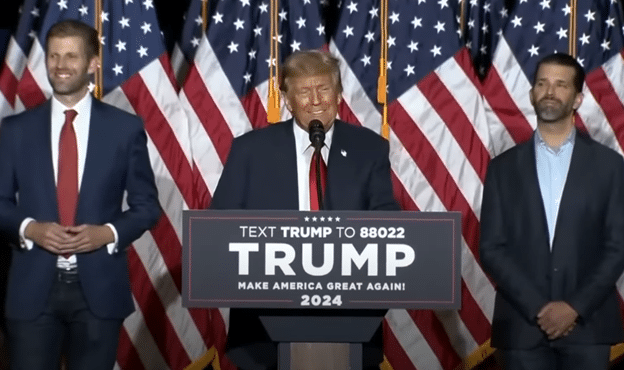January 17, 2024
Permission to republish original opeds and cartoons granted.
Trump Wins Big in Iowa but His Policies are More Popular with the Average American Than You Think

By Rick Manning
The establishment political apparatus is visibly shaken by former President Donald Trump’s nearly 30-point victory in the Iowa Republican caucus Monday, but largely labeling the victory a Trump-friendly state remaining Trump-friendly. Iowans have favored the former president in the last two election cycles, and while his victory in the caucus was historically large, it is tempting to downplay the victory as inevitable and Iowa-specific.
However, the mainstream should not assume that broad support for Trump’s policies is relegated to his base. What may be more upsetting to the mainstream than Trump’s outsized victory in Iowa – despite having more ‘moderate’ GOP options on the ballot – is just how far-reaching support is among the general public for a slew of Trump’s policies.
Recent public opinion surveys show net support among the public for policies such as finishing the wall along the U.S.-Mexican border, arresting and deporting thousands of illegals, imposing a tariff on foreign goods, encouraging prayer in public schools, requiring asylum-seekers to remain in Mexico, and banning transgender surgery and hormones for minors.
First, let’s look at Iowa. Trump beat his closest rival Gov. Ron DeSantis by 30-points, a record-breaking margin for a GOP candidate in the state. Trump secured 51 percent of the vote, and DeSantis trailed at 21.2 percent. Former South Carolina Gov. Nikki Haley came in just behind DeSantis with 19.1 percent and Vivek Ramaswamy won 7.7 percent.
This was a massive victory for Trump, and the largest margin of victory for a GOP candidate who was not a sitting president in the state’s history.
Entrance polls to the caucus sponsored by CNN show that Trump’s standing remains steady among his base, as he earned wide margins among conservatives and non-college voters.
However, Trump also ate into the margins of his competitors with less stereotypically Trump-friendly voters. He won both suburban and urban voters by twenty points, non-evangelical Christians by 22 points, ‘somewhat conservative’ voters by 22 points, and college graduates by nine points. While his support from older voters was substantial, Trump also won caucus-participants 17 to 44 by five points.
Even with two arguably more moderate choices on the ballot, Trump walked away with a landslide victory that included support from moderate subgroups of the GOP.
There is growing evidence that this trend carries over to broad support for a range of Trump’s policies among the general population too.
Consider the recent national YouGov survey of 1,000 Americans, which asked the public for their opinions on a number of Trump policies – without mentioning the Donald’s name. Support is surprisingly high for a slate of issues the mainstream labels as untenable or controversial, but the American people disagree.
On social issues, the public is much more friendly to Trump-policies than one might assume. First, U.S. adults support the banning of hormonal or surgical treatment on transgender minors by a resounding 25 points.
In the same vein, the public supports a U.S. law establishing that there are only two genders, male and female, as recognized at birth, by 18 points. Americans also support allowing parents to use public funds for religious schools by 7 points and encouraging prayer in schools by three points.
On other issues including trade and immigration, Americans are also quite favorable of Trump policies. The public holds broad support for requiring asylum seekers from Latin America to remain in Mexico while their claims are processed in the U.S., supporting the “remain in Mexico” policy by a broad 32-point margin.
Americans also support arresting and deporting illegals by 15 points and building the wall along the U.S.-Mexico border by eight points. Economically, the public shows support for one of Trump’s key strategies for equalizing the playing field on trade, supporting a 10% tariff on foreign foods imported into the country by 11 points.
This does not mean the public broadly agrees with all the former President’s policies. There is weaker support for allowing public school teachers to carry concealed weapons, which the public opposes by 5 points, and withdrawing from the World Health Organization, which the public opposes by 22 points.
However, as a whole, the American people are a great deal more receptive to a broad spectrum of Trumpian policies than may be evident on the surface. The polling asked Americans if they would support each policy on its own – without tying the policy to Trump – and reveals a perhaps more credible view of public preferences detached from the political establishment’s hullabaloo over Trump himself.
There is perhaps a ray of hope, that the stifling maze of left-wing cultural decrees that have ensnared much of Europe and Canada will be met with resistance among the American people. The public takes a formidable traditional approach to social issues like the medical transitioning of minors and the theory of multiple genders, and is directly supportive of deporting illegals, building the wall, and imposing tariffs on other nations.
Rick Manning is the President of Americans for Limited Government.
To view online: https://dailytorch.com/2024/01/trump-wins-big-in-iowa-but-his-policies-are-more-popular-with-the-average-american-than-you-think/

ALG opposes Schumer-Lankford illegal immigration amnesty deal
Jan. 16, 2024, Fairfax, Va.—Americans for Limited Government President Rick Manning today issued the following statement in opposition to a deal reported by the Immigration Accountability Project between Senate Majority Leader Chuck Schumer (D-N.Y.) and Sen. James Lankford (R-Okla.) on illegal immigration amnesty:
“Americans for Limited Government ardently opposes the Schumer-Lankford illegal immigration expansion deal. President Biden's failure to enforce the law should not be rewarded with an acceptance of more than 150,000 entries a month. The bad deal effectively normalizes catastrophic levels of illegal immigration while knowing those who created the crisis by ignoring the law for the past three years will continue ignoring it in the future. Senator Lankford is a man of honorable intentions dealing with those without them and the result must be defeated.”
To view online: https://getliberty.org/2024/01/alg-opposes-schumer-lankford-illegal-immigration-amnesty-deal/
Remember This About Trump’s Border?

To view online: https://youtu.be/k1hmvQDBcTc


Competitive Enterprise Institute: Carbon Tariff Coalition Letter
Dear Members of Congress:
As the Senate Environment and Public Works Committee is reportedly going to mark-up the PROVE IT Act (S. 1863) this week, the undersigned organizations want to express strong opposition to carbon tariffs and the PROVE IT Act. This legislation is a gateway for a carbon tax on imported goods and a domestic carbon tax.
It is shocking that legislators would contemplate advancing policy that would increase taxes, drive up prices for American families, harm workers and those on fixed incomes, and punish energy use.
Yet this is precisely what a carbon tariff does. A carbon tariff is two taxes in one. First, a carbon tariff is a tax on imported goods, borne by American consumers, workers, and businesses. Once the structure for imposing a carbon tariff has been established, it can then be used to impose a domestic carbon tax.
To think that the government would develop the administrative infrastructure to impose a domestic carbon tax without following through is naïve, at best. If the United States were to impose a tax on imports based on their carbon intensity, then there would be an expectation that domestic goods would be subjected to a comparable tax-based scheme. In fact, a domestic carbon tax might be required to meet international trade obligations.
The PROVE IT Act is not a benign government measurement scheme that will exist for knowledge purposes. It would create a detailed carbon-emissions measuring system for domestic and foreign goods, putting into place exactly what is needed to implement a carbon tariff and a domestic carbon tax.
Some proponents assert that the PROVE IT Act will help respond to the European Union’s (EU) carbon tax, otherwise identified as a carbon border adjustment mechanism. The United States should push back against the EU’s extreme green policies and not, under any circumstances, accept their disastrous environmental and energy policies.
The EU’s carbon border adjustment mechanism and carbon tariffs are a way to impose extraterritorial regulations. Recently, we have seen these types of regulations domestically, as American farmers know all too well. Some states have imposed barriers to selling goods, such as eggs and pork, based not on the nature of the goods but due to moral and ethical preferences on how food should be produced.
Just imagine foreign countries trying to impose their moral preferences on Americans by using tariffs as leverage over how the U.S. uses energy or how American farmers produce food. Carbon tariffs and the PROVE IT Act will help establish this precedent.
Maybe even worse than the imposition of all these new taxes is the purpose of the taxes. They are taxes to punish energy use. Since more than 80 percent of the world’s energy comes from coal, natural gas, and oil, which produce carbon dioxide emissions, a carbon tariff is a tax on the energy that makes modern life possible.
It would make medical care, housing, communications, food, and transportation less affordable, especially for people who already struggle to pay their bills. It would have a disproportionate impact on the poor and hurt those on fixed incomes, the elderly, and local institutions like hospitals, libraries, and schools.
The PROVE IT Act and carbon tariffs are not just bad policy, but bad politics. After all, supporting new taxes and opposing affordable and reliable energy is a toxic concoction.
A new survey sponsored by the American Energy Alliance and the Committee to Unleash Prosperity found that most Americans opposed a carbon tariff on imported goods, with 63 percent of Republicans opposed.
This opposition to paying carbon or energy taxes becomes even clearer when respondents were asked what they are willing to pay each year to address climate change. The median response was just $10, and 35 percent (including 17 percent of Democrats) said they are unwilling to pay anything. American Energy Alliance president Thomas Pyle captured the results very well:
The results reconfirm what we already knew: voters are not willing to pay any tax associated with carbon dioxide or energy – including a carbon dioxide or energy tax on imported goods. Those who believe in limited government and free energy markets continue to be allied with the vast majority of voters concerning the destructive and pointless nature of carbon dioxide taxes and on the fundamentals of the climate change issue.
As the markup of the PROVE IT Act approaches, there may be disingenuous gimmicks such as amending the bill to say it may not be used to impose a carbon tariff. Such a provision does not change the fact that the foundation would have been created to impose a carbon tariff and domestic carbon tax. Any new legislation could easily get rid of such a prohibition, and that is exactly what would happen.
The PROVE IT Act and other carbon tariffs efforts show a complete disregard for what matters to Americans. They want affordable, reliable energy to power their homes and lives, not government meddling that drives up their household bills. They don’t want federal schemes that treat energy use as a sin.
We strongly urge legislators to oppose the PROVE IT Act and any other legislation dealing with carbon tariffs.
Sincerely,
Daren Bakst Director, Center for Energy and Environment Competitive Enterprise Institute
John Droz, Jr. Founder Alliance for Wise Energy Decisions (AWED)
Phil Kerpen President American Commitment
Kristen Walker Policy Analyst The American Consumer Institute
Thomas J. Pyle President American Energy Alliance
Jason Isaac CEO American Energy Institute
Margaret Byfield Executive Director American Stewards of Liberty
Richard Manning President Americans for Limited Government
Brent Gardner Chief Government Affairs Officer Americans for Prosperity
Grover Norquist President Americans for Tax Reform
David T. Stevenson Director, Center for Energy & Environment Caesar Rodney Institute
Ryan Ellis President Center for a Free Economy
Daniel Mitchell President Center for Freedom and Prosperity
Jeffrey Mazzella President Center for Individual Freedom
Isaac Orr Policy Fellow Center of the American Experiment
Craig Rucker President Committee for a Constructive Tomorrow (CFACT)
Elizabeth Stelle Director of Policy Analysis Commonwealth Foundation
Matthew Kandrach President Consumer Action for a Strong Economy
E. Calvin Beisner President Cornwall Alliance for the Stewardship of Creation
Dr. Steven J. Allen Vice Chairman The Conservative Caucus
Jerry R. Simmons President/CEO Domestic Energy Producers Alliance
Kristen A. Ullman President Eagle Forum
Craig Richardson President Energy & Environment Legal Institute (E&E Legal)
Adam Brandon President FreedomWorks
George Landrith President Frontiers of Freedom
Cameron Sholty
Executive Director
Heartland Impact
James Taylor President
The Heartland Institute
Ryan Walker Executive Vice President Heritage Action for America
Mario H. Lopez President Hispanic Leadership Fund
Tom Harris Executive Director International Climate Science Coalition
Annette Olson Chief Executive Officer The John K. MacIver Institute for Public Policy
Jon Sanders Director, Center for Food, Power, and Life John Locke Foundation
Seton Motley President Less Government
Bob Barr Chairman, Liberty Guard Member of Congress, 1995-2003
Brandon Arnold Executive Vice President National Taxpayers Union
Daniel C. Turner Founder & Executive Director Power The Future
Donna Jackson Director of Membership Development Project 21 Black Leadership Network
Paul Gessing President Rio Grande Foundation
Bette Grande CEO and President Roughrider Policy Center
The Viscount Monckton of Brenchley Deputy Director (Intelligence) Strategic Threat Assessment Group
David Williams President Taxpayers Protection Alliance
Derrick Max President Thomas Jefferson Institute for Public Policy
Ben Zycher Senior Fellow American Enterprise Institute
To view online: https://cei.org/coalition_letters/carbon-tariff-coalition-letter/


